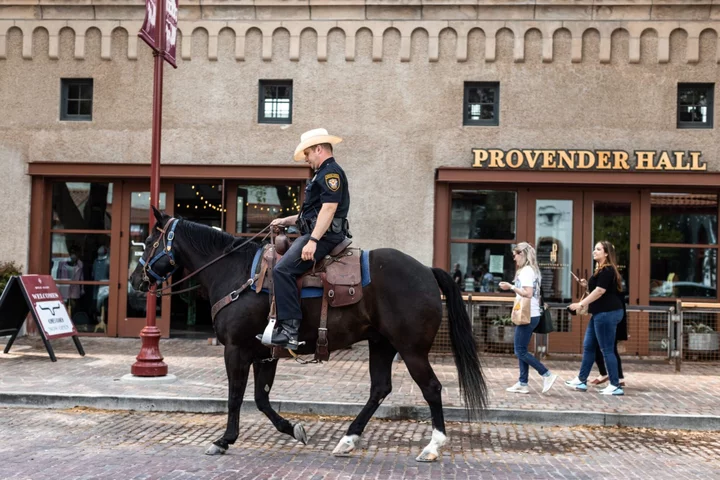The leader of the fastest-growing US city is betting that Yellowstone mania and quality-of-life issues in bigger metros can help sustain the expansion even as corporate relocations slow from the peak of the pandemic era.
Mattie Parker, the mayor of Fort Worth, Texas, says a focus on crime, homelessness, parks and reliable infrastructure has positioned the city of 950,000 as an attractive alternative to Chicago, San Francisco and New York, which have struggled with perceptions of deteriorating safety in the aftermath of Covid-19.
The 39-year-old Republican, broadly considered to be a moderate in deep-red Texas, says that Fort Worth’s pitch to lure businesses highlights its roots (the city’s slogan is “Where the West Begins”) and small-town vibes, even if its stockyards are now more of a tourist draw than a genuine agricultural enterprise. The nostalgia for cattle ranching and cowboys generated by the hit television series Yellowstone and 1923 — created by Taylor Sheridan, who partly grew up in Fort Worth — are only adding to its allure.
“Fort Worth continues to be an incredibly unique city that is very proud of our Western heritage,” Parker said in an interview at City Hall, where a display case held shovels from groundbreaking ceremonies over the years. “And the timing couldn’t be better because of this fanfare and frenzy over Yellowstone and 1923.”
In Fort Worth, it’s common to see cowboy hats and boots paired with a tailored suit. Unlike nearby Dallas, which mostly feels like any other major metropolis, Fort Worth embraces its sense of place. There’s plenty of live country music, two-step dancing and Tex-Mex cuisine.
Parker said its important that Fort Worth maintain its culture even as it pursues growth. To that end, she wants to create more public parks, and the city’s next budget proposes hiring 100 additional people for the police department to help maintain order.
“How you respond to a mental health crisis looks different today in 2023 than it did in 1985, and needs to, and we have a department that’s focused on that,” she said. “If you’re not a safe city, no one wants to live there. I mean, look at San Francisco right now.”
San Francisco and other major US cities saw a jump in property crime and visible homelessness during the pandemic that fueled perceptions among some that lawlessness was rampant. While there’s no doubt San Francisco is facing a crisis of unhoused people and seeing an exodus of businesses and residents, the increase in crime has mostly been non-violent. Measures put the California city’s homicide rate at about 6.9 per 100,000 people, far below Fort Worth’s rate of about 11.
But as San Francisco loses people, Fort Worth is gaining them. Last year, the Texas city recorded the largest population growth of all cities with more than 50,000 people, and it’s now the 13th biggest in the nation. (Among Republican mayors, no one oversees a bigger city than Parker.) The DFW metroplex, which includes Dallas and suburbs, is the fourth largest in the US. Part of that growth has been driven by major companies moving to or expanding in north Texas.
In recent years, Charles Schwab Corp. moved its headquarters to suburban Westlake, where Fidelity Investments has also been expanding. Caterpillar Inc. announced a move to Irving, 25 miles (40 kilometers) east of Fort Worth, last year.
And then there’s the transportation industry, which has long been a driver of the economy. American Airlines Group Inc. is headquartered in Fort Worth along with Bell Textron Inc., a manufacturer of helicopters, and BNSF Railway. Lockheed Martin Corp. produces its F-35 fighter jets in Fort Worth. Ross Perot Jr.’s Fort Worth logistics development, AllianceTexas, contributes billions of dollars to the North Texas economy. The project includes an industrial airport and hubs for FedEx Corp. and Amazon.com Inc.
Fort Worth will continue to focus on the aviation defense, mobility and energy industries, according to Robert Allen, who runs the new economic development partnership in the city. The city is also hopeful about contributions from universities including Texas Christian University and Texas A&M, which is building a new $150 million campus there.
Todd Burnette, a managing director at real estate firm JLL, said there are $2.3 billion of projects under construction or in the pipeline in Fort Worth. The biggest include the A&M campus, an expansion of an Omni hotel, a bigger convention center and new residential buildings.
Fort Worth has often lost to surrounding suburbs for major finance relocations and expansions. Goldman Sachs Group Inc. is building a new office tower in Dallas, while Wells Fargo & Co. has started on a new regional campus in Irving. Still, Fort Worth now has a lower office vacancy rate than at the start of the pandemic — just 13% for class A buildings — and the region’s workers have returned to the office at a higher rate than the national average.

